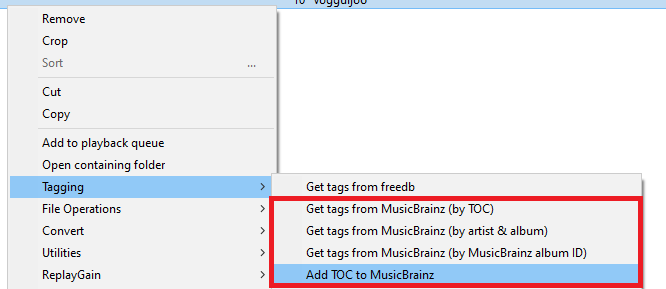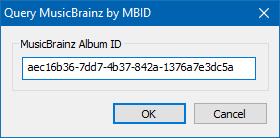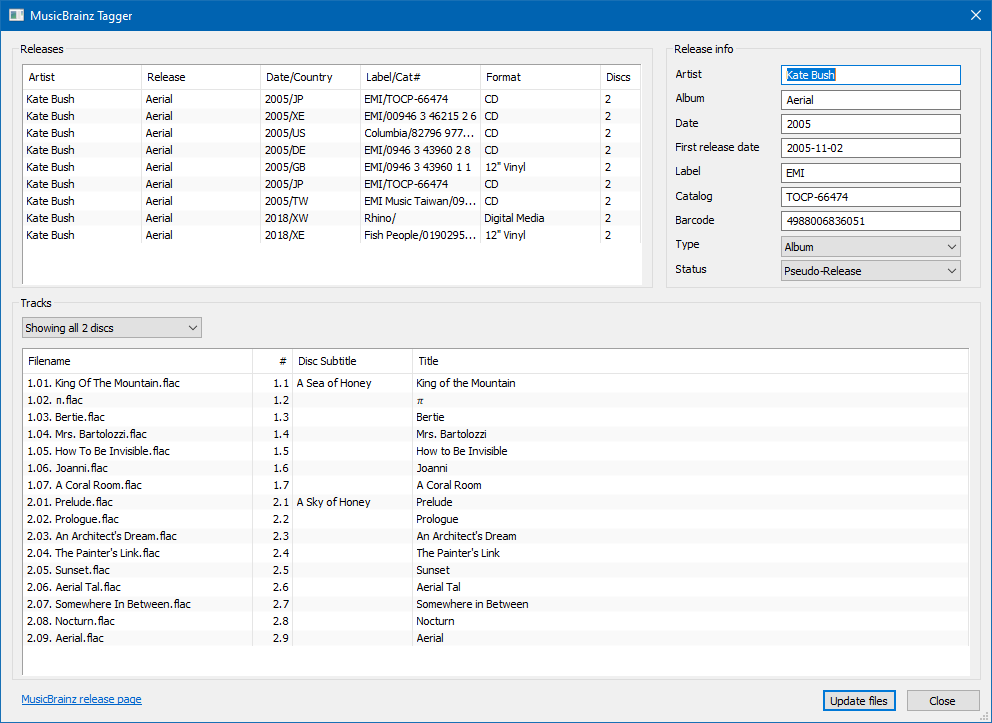MusicBrainz Tagger
Download
https://github.com/kbuffington/foo_musicbrainz/releases
Minimum requirements
Windows 7 and foobar2000 v1.4.
Installation
https://wiki.hydrogenaud.io/index.php?title=Foobar2000:How_to_install_a_component
Tag Mapping
Before you consider using this to tag your files, it’s important to note that it does not strictly adhere to the Picard tag mappings as documented here.
https://picard.musicbrainz.org/docs/mappings/
If compatibility with MusicBrainz Picard or other taggers/players that make use of MBID data is more important then you should probably avoid using this. More details of what this component does and why can be found below.
Preferences
These can be found under File>Preferences>Tools>MusicBrainz Tagger.
Usage
This is very much a dumb tagger. You can only tag complete releases (or release mediums) and all tracks must be in the same order as they appear on MusicBrainz. Tagging multi-disc releases in one go is possible but only when they are complete. If you only have parts, for example 2 discs out of 3, you’ll need to update each disc individually.
You can right click any selection of tracks from a playlist or library viewer and use one of these 4 commands.

The TOC options only appear if the selected tracks are sourced from a CD rip. This is determined by their exact length so if you’ve used an inferior CD ripper like Window Media Player, your CD rips may not have these options.
The first option looks up releases by a discid calculated from the combination of track count/lengths. If no matches are found, it’s possible the release does exist on MusicBrainz but no one has attached a discid just yet.
You can use the 2nd option to search for releases by Artist and Album name.
The 3rd option will let you do a more precise search by MusicBrainz Album ID if you know exactly which release you want to use or if you’ve tagged the files before, an existing value will be read.
You may paste full release URLs in to the popup dialog and the website will be stripped away leaving the MBID like this:
Example url: https://musicbrainz.org/release/aec16b36-7dd7-4b37-842a-1376a7e3dc5a

When one or more matching releases have been found, you’ll be presented with the main Tagger Dialog.

From here, you can choose the best match for your selection. Note that while multiple releases may match your selection count, they may have differing track orders and entirely different tracks depending on region. Sometimes, the release from your country of origin may be the worst match and you’ll have to pick another! The releases list is read-only but you can edit all other text fields and the Title column in the track list.
Note that the Disc Subtitle is only present for multi-disc releases and you can only edit the entry for track 1 of each disc. Edits will be applied to all tracks when tagging.
TOC submissions
You should only use the Add TOC to MusicBrainz option if you are a MusicBrainz editor and the selection is an actual CD in the drive. Submitted discids must be calculated from sources that take pregap information in to account. This simply is not present in ripped files.
The Nerdy Stuff
When it comes to tagging MBIDs, this component always follows the naming conventions used for Vorbis comments regardless of the underlying file format/tagging sheme.
For example, it will write MUSICBRAINZ_ARTISTID instead of MUSICBRAINZ ARTIST ID to mp3 and m4a files. Repeat that for all tags prefixed with MUSICBRAINZ.
The following differences affect id3 tagging only:
DISCSUBTITLEis written toTXXX:DISCSUBTITLErather thanTSST (SET SUBTITLE)LABELis written toTXXX:LABELrather thanTPUB (PUBLISHER)MEDIAis written toTXXX:MEDIArather thanTMED (MEDIA TYPE)MUSICBRAINZ_RECORDINGIDis written toTXXX:MUSICBRAINZ_TRACKIDrather thanUFID://musicbrainz.orgRELEASECOUNTRYis written toTXXX:RELEASECOUNTRYrather thanTXXX:MUSICBRAINZ ALBUM RELEASE COUNTRY
For Vorbis comments only, ORIGINAL RELEASE DATE is written in place of ORIGINALDATE.
The whole purpose of this is to unify tag display/search across foobar2000 regardless of file format. It’s easier to search for %LABEL% IS blah rather than %LABEL% IS blah OR %PUBLISHER% is blah which is what you’d have to do if this was Picard compatible.
Obviously this comes at the expense of potentially breaking compatibility with other taggers/players that expect this data to be written in a certain way.
One last thing… none of this behaviour is new. It was all inherited from the original component by Dremora.
